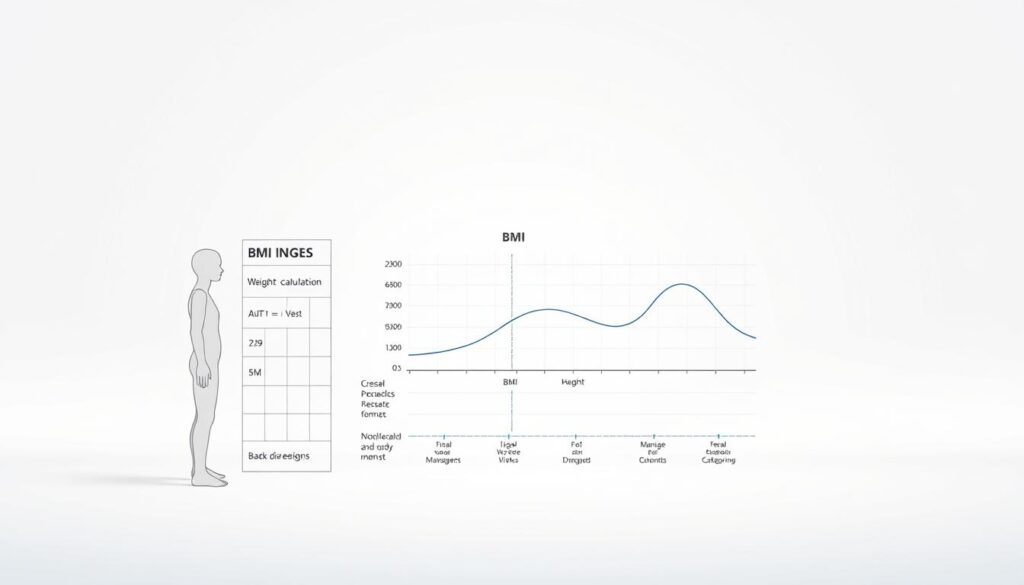Can a person’s weight really affect their mental well-being? The answer is yes. It’s all about the link between body mass index (BMI) and psychological health. Studies show that being overweight can cause many mental health issues. These include feeling bad about oneself and even depression.
With obesity rates going up, it’s key to look at how BMI impacts mental wellness. We’ll dive into what makes this issue so complex. We aim to give you a full picture of the topic.
Key Takeaways
- The psychological impact of BMI on individuals can be significant.
- Excess weight is linked to various mental health concerns.
- Understanding the BMI-mental health connection is vital for overall wellness.
- Several factors contribute to the complex relationship between BMI and mental health.
- Addressing these factors is crucial for improving mental well-being.
Understanding BMI: What It Is and Its Calculation
BMI, or Body Mass Index, is a key tool in health assessment. It helps doctors see if a person’s weight is healthy for their height. It’s simple but very useful.
The Definition of BMI
BMI is your weight in kilograms divided by your height in meters squared. It sorts people into weight groups like underweight, normal, overweight, and obese. For example, a BMI of 30 kg/m2 or more is considered obese by the World Health Organization.
Dr. Margaret Ashwell, a famous obesity expert, said, “BMI is a good way to check body fatness for most people. It helps spot health risks.” But, it’s not perfect, and we’ll look at why later.
How to Calculate Your BMI
Calculating your BMI is easy. Just use the formula: BMI = weight (in kg) / height (in meters)2. For example, if you weigh 65 kg and are 1.65 meters tall, your BMI is 65 / (1.65)2 = 24. This number tells you your weight category.
To make it easier, check out the infographic below. It shows how to calculate BMI and what each category means:
Limitations of BMI as a Health Indicator
BMI is useful but has its downsides. It doesn’t tell the difference between muscle and fat. So, athletes or people with a lot of muscle might have a high BMI without being too fat. As Dr. Steven Heymsfield, an obesity and body composition expert, says, “BMI is not perfect, but it’s a good start for health risk assessment.”
BMI also doesn’t consider waist size, blood pressure, or metabolic health. So, it’s best to use it with other health checks for a full picture of health.
The Connection Between BMI and Mental Health
The link between Body Mass Index (BMI) and mental health is complex. BMI shows more than just physical health. It also affects our mental well-being.
How BMI Affects Self-Esteem
BMI greatly impacts our self-esteem. Studies show that those with a BMI outside the norm face lower self-esteem. This is due to societal beauty standards.
Here are some ways BMI affects self-esteem:
- Social stigma against being underweight or overweight
- Media pushing ideal body types
- Personal body image shaped by culture
These factors can harm our self-image. This affects our confidence and mental health.
The Impact of Body Image on Mental Well-Being
Body image is key to our mental health. A bad body image can cause anxiety and depression.
Research shows that obesity increases depression risk by 18% to 55%. Depression also raises the risk of obesity by 37% to 58%. This shows how body image, BMI, and mental health are connected.
- Eating disorders from unhealthy body views
- More stress and anxiety over body looks
- Lowered self-esteem and confidence in daily life
To tackle these issues, we need a broad approach. This includes promoting positive body image and supporting mental health.
Mental Health Disorders Associated with BMI
Mental health issues like anxiety and depression are linked to BMI. The connection involves biology, psychology, and society. It’s complex.
Anxiety and Depression
People with higher or lower BMIs face a higher risk of anxiety and depression. Many factors, like inflammation and neurotransmitters, play a role. For example, obesity can lead to more inflammation, which is linked to depression.
Societal pressure and stigma about body weight can make anxiety and low self-esteem worse. This shows we need a complete approach to tackle these problems.
Eating Disorders and Their Link to BMI
Eating disorders, like anorexia and bulimia, are closely tied to BMI. These conditions lead to abnormal eating habits that affect weight and health.
- Anorexia nervosa causes extreme weight loss and a very low BMI.
- Bulimia nervosa involves bingeing and purging, leading to a normal or slightly high BMI.
- Binge eating disorder results in overweight or obesity due to excessive eating.
It’s key to understand the link between eating disorders and BMI. This helps in creating treatments that address both physical and mental health.
The Role of Physical Activity in Mental Health
Physical activity and mental health are closely linked. Regular exercise boosts our physical health and mental well-being. It’s a win-win for our overall health.
Benefits of Exercise on Well-Being
Exercise helps reduce anxiety and depression by releasing endorphins. These “feel-good” hormones improve our mood and sleep. It also boosts our energy and helps us deal with stress.
Research shows that regular exercise leads to better mental health. It boosts self-esteem and body confidence. These are key for our mental well-being.
Key Benefits of Exercise on Mental Health:
- Reduces symptoms of anxiety and depression
- Improves mood and overall sense of well-being
- Enhances sleep quality
- Increases energy levels
- Promotes self-esteem and body confidence
Exercise as a Tool for Managing BMI
Exercise is vital for managing Body Mass Index (BMI). It burns calories, builds muscle, and boosts metabolism. These actions help maintain a healthy weight.
Exercise also helps identify risks of obesity. It’s a proactive way to manage BMI and improve overall health.
| Exercise Type | Caloric Burn | Mental Health Benefit |
|---|---|---|
| Aerobics | 400-600 calories/hour | Reduces anxiety, improves mood |
| Strength Training | 200-400 calories/hour | Enhances self-esteem, reduces stress |
| Yoga | 150-400 calories/hour | Improves flexibility, reduces anxiety |
Different exercises offer unique benefits. They help with calorie burn and mental health. Mixing them into our routine can manage BMI and improve well-being.
Nutrition, BMI, and Mental Health
Nutrition is key for both BMI and mental health. It affects our overall well-being. Looking at what we eat can show if we’re missing or eating too much of certain nutrients.
The Relationship Between Diet and Mood
What we eat greatly impacts our mood and mental health. Eating too much processed food, sugar, and unhealthy fats can harm our mental state. But, eating foods like fruits, veggies, whole grains, and lean proteins can help our mental health.
Some foods, like fish and berries, are good for our brain. They have nutrients that help our mental well-being. Adding these foods to our diet can improve our mood.
Foods That Promote Mental Well-Being
Eating a variety of whole foods is important for mental health. Some of the best foods include:
- Fatty fish like salmon, rich in omega-3 fatty acids
- Leafy greens such as spinach, high in folate
- Nuts and seeds, good sources of healthy fats and antioxidants
- Whole grains like quinoa and brown rice, rich in complex carbohydrates
- Fruits like berries, high in antioxidants
For more tips on managing BMI through diet and other methods, check out our page on BMI weight loss strategies.
| Food Group | Examples | Benefits for Mental Health |
|---|---|---|
| Fatty Fish | Salmon, Sardines | Rich in omega-3 fatty acids, supporting brain health |
| Leafy Greens | Spinach, Kale | High in folate, which can help reduce symptoms of depression |
| Nuts and Seeds | Almonds, Chia Seeds | Good sources of healthy fats and antioxidants, supporting overall brain health |
The Stigma of BMI and Mental Health
The stigma around Body Mass Index (BMI) deeply affects mental health. Societal views on weight and body shape can lead to discrimination. This can harm self-esteem and overall well-being.
How Societal Standards Influence Self-Perception
Societal standards often push unrealistic body ideals. This leads to body dissatisfaction and a negative self-image. Studies show that weight-related stigma can cause mental health problems like depression and anxiety.
“The cultural idealization of thinness can lead to a stigmatization of individuals who do not conform to these standards, resulting in psychological distress.”
This stigma affects many areas of life, from social interactions to job opportunities. It’s key to understand how societal standards impact self-perception and mental health.
| Impact of Stigma | Mental Health Effects | Social Consequences |
|---|---|---|
| Weight-related stigma | Depression, anxiety | Social exclusion, marginalization |
| Body dissatisfaction | Low self-esteem, eating disorders | Negative body image, self-consciousness |
The Importance of Acceptance and Inclusivity
Promoting acceptance and inclusivity is key to fighting BMI-related stigma. By valuing diversity in body shape and size, we can lessen the psychological impact of societal standards.
Strategies for promoting inclusivity include:
- Encouraging diverse representations in media
- Supporting body positivity initiatives
- Educating the public about the limitations of BMI
By embracing inclusivity, we can build a supportive environment. This environment promotes mental well-being for everyone, regardless of shape or size.
Strategies for Improving Mental Health Related to BMI
To boost mental health tied to BMI, a complete plan is needed. This plan should cover both physical and mental health. Studies show that programs focusing on behavior can help those with obesity and mental health issues. This shows the power of combining different methods.
Setting Realistic Goals
Starting with achievable goals is key to better mental health tied to BMI. It’s not just about losing weight. It’s also about improving overall well-being.
It’s important to set goals that are realistic and slow. For example, aiming to lose 1-2 pounds a week is better than trying to lose a lot quickly. This slow pace keeps you motivated and avoids mental health problems.
| Goal Type | Realistic Goal | Unrealistic Goal |
|---|---|---|
| Weight Loss | Losing 1-2 pounds per week | Losing 10 pounds in a week |
| Exercise | Exercising 30 minutes, 3 times a week | Exercising 2 hours daily |
Building a Supportive Community
A supportive community is crucial for mental health, even with BMI issues. Such a group offers encouragement, understanding, and motivation.
“Surround yourself with people who support and encourage your journey towards a healthier lifestyle.”
To build this community, you can join weight loss groups, participate in activities that boost well-being, and seek professional help when needed.
By setting realistic goals and creating a supportive community, you can make big strides in improving your mental health related to BMI.
Conclusion: A Holistic Approach to BMI and Mental Health
It’s important to treat obesity and mental health as chronic diseases that affect each other. The link between BMI and mental health shows we need a full approach to tackle these issues. Studies show that people with obesity are 55% more likely to have depression. On the other hand, those with depression are 58% more likely to become obese.
This shows we must look at both physical and mental health when dealing with BMI and mental health.
Professional Support and Balanced Lifestyle
Getting help from professionals is key for those dealing with BMI-related mental health problems. A balanced lifestyle, including healthy eating and exercise, can greatly improve well-being. This approach helps manage BMI and mental health better, leading to a higher quality of life.




